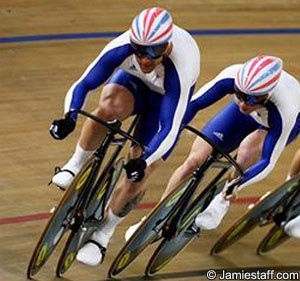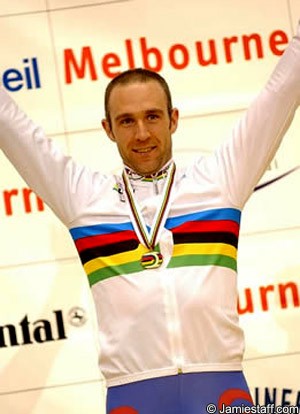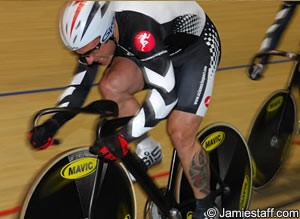Olympic gold medallist training future track stars after quiet retirement
 It’s perhaps ironic that the man who flashed on to the GB track scene like a comet, a decade ago, should quietly slip away to start the next phase of his career.
It’s perhaps ironic that the man who flashed on to the GB track scene like a comet, a decade ago, should quietly slip away to start the next phase of his career.
GB Olympic team sprint champion, 37 year-old Jamie Staff from Ashford in Kent was still fast enough to take World Championship silver at the discipline in 2009; but decided to end his glittering career whilst at the top.
His goal now is to place other riders on the podium and restore US track cycling to the heady days of the Hegg or Northstein eras.
After a stellar BMX career which began when he was just nine years-old, winning British, US and World titles, it is as a team sprinter that Staff is perhaps best remembered.
He won gold twice with the GB team, in 2002 and 2005. The first title was achieved after little more than year on the track following his switch from small wheels.
He was the fastest starter in the world, leading GB off to Olympic gold at Beijing. His time of 17.1 seconds is still the best-ever recorded over one lap of a 250 metre track from a standing start.
But it’s easy to forget that he was also world keirin champion in 2004 and one of the corner stones of the remarkable GB track revival since the turn of the millennium.
Velo Nation recently caught up with Staff to talk about his track career and the new challenges he faces.
—
VeloNation: Why quit when you did, you were still in the Worlds medals for the team sprint in 2009?
Jamie Staff: I wanted to leave racing on top. I was getting older and knew I would have my work cut out to even get to London. I’d lost the desire. Once you lose the desire, you’re wasting your time.
You have to want it more than anything else in the world; and I didn’t anymore. I have been looking forward to the next chapter of my life for a while now, and so I have absolutely no regrets.
VN: Do you still have that ‘fastest first lap, ever’ for the team sprint ?
JS: Yes, there are two riders who I believe have come within two tenths of it, but I still hold the record. I’m not sure if I see it being beaten this year, maybe during Olympic year ?
VN: Your move to the USA as coach didn’t seem to attract much UK media attention.
 JS: I’m sure it didn’t!
JS: I’m sure it didn’t!
I’m not one for making big announcements, and so felt better to just quietly slip away.
VN: Did you ever consider moving in to the GB coaching machinery ?
JS: No, not that I wouldn’t, it’s just that my wife is American and so are my kids. We always planned on moving back here when I was done playing on bicycles. I think they have a good system in GB and I’m sure it will continue to thrive.
VN: What shape is US track racing in, compared to say, GB ?
JS: Poor, to be honest. We’re so far away from Europe where most cycling action takes place, that I feel the Americans lose perspective. I will be taking my riders to Europe this year to get some of that exposure. They have the passion, it’s just going to need some caressing.
VN: Is there a good core of talented young US riders?
JS: Americans love sport, any sport so, yes, there are lots of kids with potential. The problem I believe lies with kids having to make choices based on a long term career.
If you can get scholarships for other sports and have lucrative careers in other sports, you’re always going to struggle persuading those kids to take up track racing…it pays basically nothing.
VN: With the new UCI World Cup and Worlds qualifications rules, is life tougher for you ?
JS: For sure, this time round. However, my riders will come out fighting to qualify for the Rio Olympics in 2016. I said up front that we would be lucky to even get a plane ticket to London; but in six years time I will have had a lot more time to develop riders and put them in a position where they can score points easily.
I don’t believe the UCI is going in the right direction in terms of attracting people to the sport of track cycling. If you make it so restricted in terms of how many participants there can be, then that does the sport no good.
VN: What are your long-term goals for the team?
JS: To get to London, to get two medals in Rio and then have a well-developed program that runs like a machine in terms of developing young talent and turning them into champions for the future.
VN: You spent a lot of time in the US with BMX. Do you prefer it to the UK ?
JS: The BMX scene in the UK is poor. It’s full of people that just want to play around. They are content to just be mediocre, they lack the drive that some riders like myself, Dale Holmes, Andy Ruffle, Tim March, Neal Wood and more had, to be the best they can be.
That infuriates me and so I’m a lot happier being in a sport that is a lot more professional. The US BMX scene will always be the best, but, the Europeans are performing better because they have money from their Governments which allows them to get the financial support for the riders.
 VN: Are you still on the bike?
VN: Are you still on the bike?
JS: Not as much as I would like. I like mountain biking the best, but it takes a while to get out to some good trails. I went on the velodrome once and have been on my road bike a handful of times, but still don’t have the spark.
VN: What was your favourite discipline when you raced ?
JS: BMX for the competition, Track racing for its professionalism. The keirin was the most fun, but I did enjoy a Team Sprint too!
VN: What was the highlight of your career?
JS: I have so many fond memories, from day one of BMX to the Olympics. Obviously my best achievement was the Olympic Gold, and that was because of how much I pushed myself and got out of my comfort zone. The training was very hard, but the race itself was the easiest race of my life, no kidding. It was the most prepared for an event I had ever been, that’s why it was so easy.
VN: You were very fast and tactically good as a team sprint and keirin man; but never seemed to exploit that in sprinting – why?
JS: Sprint takes patience, I’m a go and stop kind of racer! Keirin needs a little patience, but not much. In sprinting, you have to be patient and it’s kind of like chess. I sucked at chess – I like to go flat out from the get-go.
Chris Hoy is actually very good at chess… so there you go, if you’re good at chess, you can be a good sprinter!
VN: Did you ever think about a road career ?
JS: No, I didn’t enjoy it when I was younger. I do more now, but it’s a bit late!
VN: Dmitriev won the Euro sprint – was that a surprise?
JS: Yes, Hoy made a big mistake, but he’s better making them now and learning than in 2012. It’s early season and so the big hitters like the French, some GB’s and the Germans are still in their pre-season training. It’s going to be an exciting season though – but I predict the same guys at the top.
VN: London 2012 – can GB repeat Beijing ?
JS: Well, they can’t because some of the events have been removed. I would like for them to do well in all events, but with Dave Brailsford’s attention turned to the road, I think it’s having an effect on the track team. You need a leader.
If your leader goes off and leads something else, you get consequences. At the end of the day it comes down to the riders obviously, but having someone to lead the army is the key. It gives the rider the belief they have the backing.
If you remove that and the riders feel like they are on their own, then cracks can appear. I see some cracks appearing!
VN: Any career regrets ?
JS: Not having support sooner. I think I had the potential to win a lot more races, but didn’t have the technical support when I was younger. I guessed it all until I was about 29.
There was a bit of structure from 29 to 32, then I was well-guided from 33 until I retired at 35. Still, not a bad career off a bunch of guesses!
I would like to thanks Iain Dyer, Shane Sutton, Mark Simpson, Steve Peters plus all the EIS staff for their support. Without them I would not of achieved what I did at the end. Thank you. And my Team mates were pretty cool too!